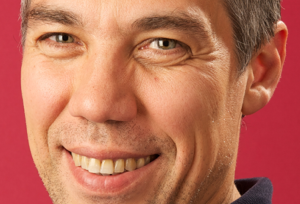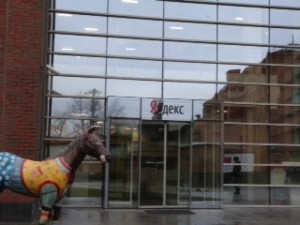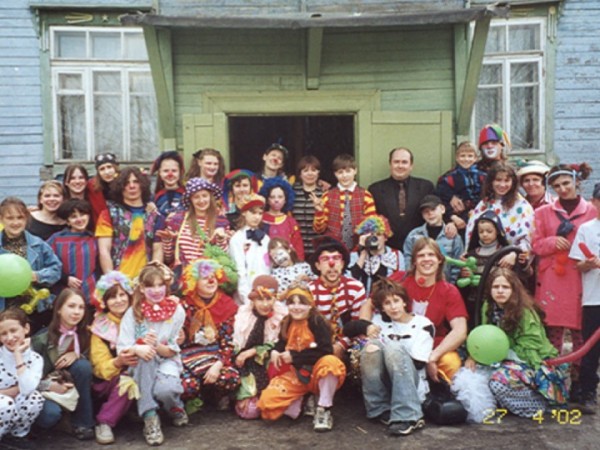In Memoriam: Ilya Segalovich Of Yandex, Search Engine Pioneer, Leader & Visionary
Ilya Segalovich, co-founder of Yandex, Russia’s largest search engine, was disconnected from life support on July 27. During routine cancer treatment, he unexpectedly slipped into a coma earlier in the week from which he did not recover. I had the honor of knowing Ilya personally. In addition to being one of the most brilliant search […]

Ilya Segalovich. Source:Yandex
Ilya Segalovich, co-founder of Yandex, Russia’s largest search engine, was disconnected from life support on July 27. During routine cancer treatment, he unexpectedly slipped into a coma earlier in the week from which he did not recover.
I had the honor of knowing Ilya personally. In addition to being one of the most brilliant search scientists I’ve ever met, he was also a humble, compassionate, and funny human being. I thought it appropriate to pay tribute on the news of his unfortunate and untimely demise.
It was a cold November morning in Moscow when I first met Ilya Segalovich. I had organized a comprehensive research visit talking to many different people within the company and was surprised and delighted when one of the founders agreed to meet me, albeit for a brief half hour session. I could hardly complain.
Ilya Segalovich and school-friend Arkady Volozh had created a technological phenomenon which had beaten all other Russian contenders to become the dominant search engine in Russia. At the time of my first visit, Google was expanding internationally but had not yet made any serious impact in Russia — nor was it clear that Google would become the global force it is today. I covered the history of Yandex and Ilya’s rise to fame in an earlier post.

Yandex Headquarters. Source:Webcertain
Ilya’s Yandex built itself into a force in Russia that Google failed to dent until at least 2006 — and even then, the Yandex fortress Arkady and Ilya built together, resisted. It continued to resist when Google focused huge advertising resources on Russia and resisted again when Google pushed search through Chrome and then Android.
Although this was before Yandex’s IPO, I was about to meet someone who was already an icon in search and thirty minutes seemed eminently fair. I was nervous. I walked into the seventh floor meeting room of Yandex on Leo Tolstoy Street in Moscow and set my notebook down on the meeting table. Ilya followed me just a few moments later, and I was instantly taken with his warmth and grateful for his great command of English, meaning I didn’t have to even try my rusty old broken Russian.
We introduced ourselves and Ilya said he had some slides he’d like to talk me through. The first slide explained how Yandex had been innovating since the very beginning and had often preceded Google with new features. It quickly dawned on me how frustrating it must be to be the CTO of a search engine constantly described as “the Google of Russia” and accused of copying everything Google did when in reality you were innovating for your own reasons and from your own insights.
Our thirty minutes ran into an hour. My Yandex hosts were looking at their watches and disappearing to re-schedule other conversations. I put my notebook on the table and stopped taking notes. The conversation did not stop and was rapidly taking over the day. I was particularly shocked to discover that Yandex executives were allocated bloggers to monitor, and I was being monitored by Ilya personally. Perhaps that was why I so quickly felt like we had known each other for years.

First Meeting With Ilya.
After more than two hours of discussion, we simply had to move on though we could’ve continued all day if we’d been allowed. We’d been through the history of search, the early days of search in Russia, the importance of scale before looking into the future. Just about everything you could imagine would interest two search-obsessed geeks who’d just met and had completely lost track of time.
Yandex’s Roman Chernin, Head of Search Projects, expressed my own experience of Ilya perfectly: “Sometimes it felt like talking to someone who lives five years in the future. Sometimes, you would understand very clearly that what you hear or see is only a flat, black-and-white projection of the multidimensional colored picture he had in his head. This was difficult, but also interesting. Like solving a puzzle. And sometimes, Ilya would be highly specific and would get very upset that he couldn’t come and use his hands to fix ‘such a simple thing’.”
“Twenty Minutes At My Master Class And You’ll Be Juggling”
During our first meeting, Ilya looked years ahead and predicted that search engine technologies will be available as open source programming code. We have to wait and see if that really happens. My favorite comment was when he pointed out excitedly that over 20 nations have space programs and only 5 have search engines, “so you see Andy, creating great search engines is more difficult than rocket science!” We finished our conversation wishing each other well and he promised he’d be sure to connect with me at a conference in the future.
It felt like one of those polite comments people make that you think will never happen. When I discovered later that lots of visitors had the same experience, I felt this even more. But some years later Ilya delivered on his promise when he joined Chris Sherman and I for a remarkable fireside chat session at the International Search Summit during SMX London in May of this year—at a time when Ilya was fighting the illness that ultimately claimed his life. The audience saw someone at the height of his powers, intellectually impressive and without any hint of the weakness that was gnawing away at his life.
The team in Moscow told me that he never gave in to illness and was as committed as ever. Yandex developer Vsevolod Velicho says, “I was watching ‘Cowboy’ (a Russian comedy where an Ilya is the main character) today and laughing. I was thinking how Ilya would come to meetings right after his illness, exhausted, and still wouldn’t stop making jokes and telling us new and interesting stuff. His catchphrase was, “My word, twenty minutes at my master class and you’ll be juggling.” I never managed to join and learn, but never had doubts that if I ever was to learn, of all people, it would be Ilya who would teach me.
“[My colleagues and I] giggled a week ago, saying you can tell the big cheese from afar—people are coming in and out of the canteen door, and he’s waiting there humbly holding the door open for everyone.”
“He Was Afraid Of Nothing, Was At The Forefront, Waited For Us There”
Attending that London keynote was just an example of how he gave so much to the people around him — as Yandex Search Project Manager, Lena Gruntova says, “Everything he ever did was to make everyone’s life better. Just like that. Delicate, subtle, kind, intelligent, gracious, inspired, luminous. He was afraid of nothing, was at the forefront, waited for us there. And he still does.”
Ilya was certainly passionate about driving the Yandex technology forward. Also in London, he took time out to pre-brief me, with his team, on the latest Yandex technical launch known as “Islands.” Islands is about effectively giving the power to webmasters to start the users journey earlier in the SERPS. I personally nicknamed it “interactive snippets” to help me grasp the concept, which is something like the next step beyond today’s rich snippets.
I remember being worried about the reaction of webmasters who had been very concerned with similar approaches with Google’s SERPS; for instance, toward having an internal search box directly under the result. Ilya’s passion showed as he moved his arms and said, “But it’s their data, they own the data,” a topic he cared greatly about.
“Wearing A Clown’s Hat On The Way From The Board Of Directors’ Meeting”
Ilya was larger than life outside of Yandex, too. Yandex Head Search Project Manager, Fedor Romanenko said, “Ilya Segalovich is a great person, he made Russia’s best company. He has a large family, in which he brought up beautiful kids. Together with his wife he made a lot of orphaned kids happy. The lives of these children are invisible on a macro scale, but it doesn’t mean they are unimportant. This is something where no one, even someone super-talented rolling over ideas, people and money, can get anywhere other than by giving one’s precious time and love. Wearing a clown’s hat on the way from the board of directors’ meeting, looking after his children every day for many years, moving big, important things to where they belong.”
Ilya and his wife ran a children’s care centre which uses art to enrich and develop the lives of young orphaned children. Known in Russian as “Дети Марии,” this translates as “Maria’s Children,” but they were really Ilya’s children, too.

Maria’s Children Clown Event. Source: Maria’s Children
Maria’s Children was founded in 1993 after Ilya’s wife Maria Yeliseyeva and her friends began visiting children in orphanages. The volunteers began to take children home with them on weekends and holidays and to paint with their eager pupils, using art as a means to open a new world for children deprived of a normal family experience. She and her husband Ilya decided to create the center after seeing the delight with which the children took to painting.
Yandex CEO and co-founder Arkady Volozh was not only Ilya’s business partner and colleague but a lifelong friend. He says, “Ilya’s contributions to the founding and development of Yandex were invaluable. More importantly, his philanthropic contributions touched many children in need. My thoughts and those of all of the Yandex family are with Ilya’s family at this difficult time. We know that the strong technical team Ilya helped to build will carry on the work Ilya cared so passionately about. Ilya was an encyclopedia in technology and his high ethical standards have always set the landmark for us all.”
I’ll close with the words of Yandex Search Project Manager Lena Gruntova, who uses the Russian friendly name for Ilya, “Ilyusha is the man of the future. Using ‘was’ talking about him is so unnatural. That’s not about him. He was interested in living, in doing, in ‘making it work.’ He would get completely immersed in an idea and shared it with us so generously, dragged us along, showed us the beautiful new worlds in his head, and was happy to argue and debate for hours, persuade, relate, exclaim, flail arms, draw pictures and make everyone laugh until we all managed to finally catch a reflection of the wonderful and wondrous.”
Besides his family and philanthropic achievements, Ilya’s legacy is Yandex, the third most popular search engine in the world. And for his team, taking care of Ilya’s “wonderful and wondrous” technology is no longer about work, it’s personal.
Contributing authors are invited to create content for Search Engine Land and are chosen for their expertise and contribution to the search community. Our contributors work under the oversight of the editorial staff and contributions are checked for quality and relevance to our readers. The opinions they express are their own.
Related stories